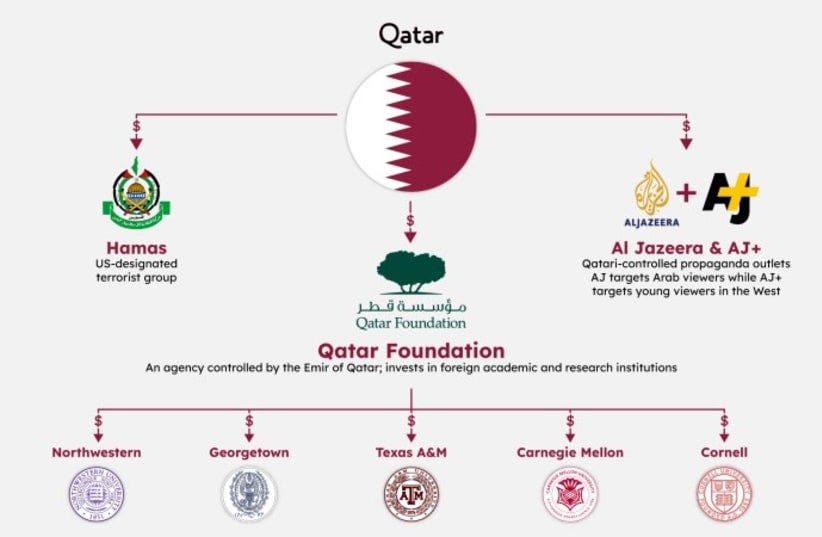Qatar’s Influence Operations in the U.S. Education System
How Qatar Influences the U.S. Education System to Push Anti-Western and Pro-Terror Narratives

Qatar has been steadily expanding its influence over the U.S. education system, funding programs in K-12 schools and universities that promote its political and ideological narratives. The Qatar Foundation International (QFI), the U.S. arm of the Qatar Foundation, has invested millions in American schools, embedding Arabic language and cultural programs that some critics argue are vehicles for soft power influence. As scrutiny grows over the role of foreign governments in shaping American education, Qatar’s involvement raises pressing concerns about transparency and accountability.
One recent controversy at a Brooklyn public school illustrates this issue. At PS 261, a classroom map funded by QFI omitted Israel and labeled the territory as “Palestine.” By removing Israel from the map, it contributes to erasing Jewish identity from the land and further promotes the narrative of the delegitimization of Israel. This incident highlights how QFI’s involvement in U.S. schools can shape students’ perceptions in ways that align with Qatar’s geopolitical positions
Qatar’s Financial Footprint in U.S. Schools
QFI has provided over $1 million to the New York City Department of Education between 2019 and 2022, funding dual-language Arabic programs at PS 261 and other Brooklyn schools. Nationally, QFI has poured millions into K-12 districts in cities like Washington, D.C., Houston, and Tucson, Arizona.
Unlike typical education grants, QFI’s funding requires schools to submit progress reports, host QFI-sponsored events, and participate in Qatar-approved professional development programs. This highlights how Qatar uses its financial influence as a way to inject its perspectives in American classrooms under the pretext of cultural exchange.
A Coordinated Influence Strategy
QFI operates similarly to China’s now-defunct Confucius Institutes, which were shut down due to concerns about Beijing’s undue influence on American education. Like the Confucius Institutes, QFI is shaping discussions about the Middle East, Islam, and geopolitical conflicts involving Israel and Palestine.
QFI-sponsored lesson plans redefine terrorism in a way that downplays Islamist extremism. Investigative reports show these programs encourage students to adopt a critical stance on U.S. foreign policy while promoting narratives aligned with Qatar’s allies, including Hamas. Qatar is a major financer of terrorism, and has hosted top Hamas officials and given them an estimated $1.8 billion to support terror activities.
In some cases, QFI-funded educational material includes activities requiring students to express loyalty to Qatar, mirroring propaganda tactics used in authoritarian states. Lesson plans also introduce a framework where students are encouraged to challenge Western narratives on democracy and human rights while subtly justifying radical ideologies.
Qatar has also influenced teacher training programs, requiring educators to attend QFI-sponsored workshops that frame Middle Eastern history and politics through a lens favorable to Qatar. This training includes participation in QFI-funded trips, conferences, and networking events where ideological perspectives are reinforced, further embedding Qatar’s influence in American classrooms.
Legal and Political Backlash
Watchdog groups like the Lawfare Project and Judicial Watch are demanding greater transparency and that schools or universities receiving QFI funding should register as foreign agents under the Foreign Agents Registration Act (FARA). The Zachor Legal Institute recently sued the U.S. Department of Education to obtain records on Qatari funding at universities such as Georgetown, Northwestern, and Harvard. Texas A&M University shut down its Qatar campus after reports surfaced of nearly half a billion dollars in Qatari funding influencing operations
What’s Next for U.S. Education?
The Brooklyn school map controversy is just one symptom of a larger problem: foreign influence in American education. While the map was removed, Qatar’s financial involvement in U.S. schools remains an issue.
As lawmakers and watchdog organizations push for stricter oversight, the challenge remains: how can the U.S. block hostile foreign governments from embedding their own political agendas in American classrooms?


